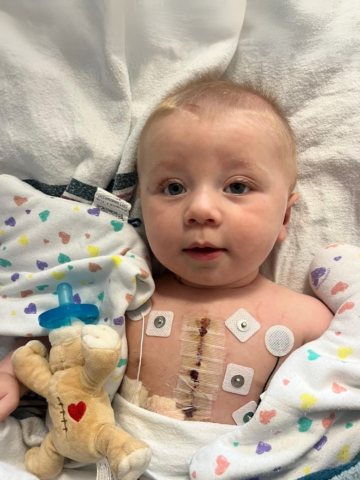The news comes as a shock, usually during the first prenatal ultrasound between the 16th and 20th week of pregnancy. Treatment planning, however, cannot begin too soon when a developing baby is diagnosed with a complex birth defect.
Some babies are born with complex conditions requiring surgery during the first few hours following birth. From the moment prenatal testing reveals an abnormality, CHOC Children’s is ready to help with the prenatal care and birth planning necessary to ensure the best-possible outcome.
CHOC has a trained and experienced team that includes perinatologists, neonatologists, pediatric surgeons and NICU nurses to guide families through the months before delivery. And families are essential to the planning process.
“The well-being of the child is surprisingly dependent on the well-being of the family, both psychologically and emotionally,” said Dr. David Gibbs, division chief, pediatric surgery, CHOC Children’s Specialists. “Preparation helps the family cope better, and the family that is coping better is able to provide better care for their child.”
According to Dr. Gibbs, recent advances in the care and outlook for babies born with abnormalities have come from closer prenatal coordination with perinatologists and families, combined with highly specialized neonatal intensive care. The CHOC NICU is rated by the American Academy of Pediatrics as a Level 4 NICU, the highest designation available and given only to facilities that also provide onsite surgical repair of serious congenital or acquired malformations.
That immediate access to the full NICU medical team, resources and support is critical for babies born with gastroschisis, a condition that requires surgery within the first hour following birth, and omphalocele, which must be corrected within the first few days. For the smallest and sickest, CHOC’s Small Baby Unit offers additional support to help babies grow and recover more quickly with fewer infections and setbacks.
For babies born with congenital diaphragmatic hernia, the CHOC Surgical NICU provides the optimal environment in which to stabilize and gain strength before surgery. One special room inside the CHOC NICU converts into a state-of-the-art operating room, allowing pediatric surgeons to perform delicate procedures within the unit.
And babies born with congenital cystic adenomatoid malformation (CCAM) may actually get to go home for continued evaluation months before surgery.
Deciding Where You’ll Deliver
Dr. Gibbs added that an important element of prenatal planning is deciding in advance where your baby will be born. Moms who know their baby will need surgery may choose to deliver at a hospital that is near a pediatric facility like CHOC. When the baby is born, the CHOC Transport Team is ready 24 hours a day to transport the baby to CHOC from hospitals throughout the region. Specially trained and equipped, this team uses ground and air transportation to travel to and from hospitals throughout Orange, Los Angeles, Riverside, San Bernardino and San Diego counties — and even beyond.
“We expect most children will do well and have normal lives,” Dr. Gibbs said. “But the first step is meeting with the perinatologist, pediatric surgeon and NICU team. Starting that relationship as soon as possible will make the process of coping with what may seem to be an overwhelming process a lot easier.”
CHOC’s surgeons provide cardiothoracic surgery, gastrointestinal (GI) surgery, general surgery, neurosurgery, urological surgery, otolaryngological (ENT) surgery, plastic surgery, ophthalmologic surgery and orthopedic surgery.





